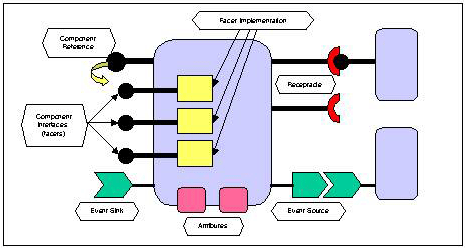|
|||
|
 |
| CORBA components. |
The complete Open Source CCM platform will consists of IDL/CIDL compilers, code generators for Java and C++, a new flexible runtime container technology, packaging and assembling tools, and a distributed deployment infrastructure. Furthermore, telecom specific CCM adaptations and a support for multiple ORB products will be developed.
As part of COACH, a component test environment and a new security architecture is addressed. The component test environment includes a test framework for test specification, test implementation and test execution, runtime visualization of component interactions and interactive or scripted component testing. The Security architecture covers platform independent definition of security policies, policy definition language, and platform specific enforcement for CCM.
Two distributed telecommunication applications, a Network Management Framework and a Parlay Platform are going to be implemented to evaluate the suitability of the COACH framework. The use of CORBA components for network management should bring a common solution for integrating the different network management legacy in terms of switching technology (different suppliers) of network nature (terrestrial, submarine) and of network management standards. Taking into account the Parlay Platform will allow the consideration of secure application requirements, access control and usage policy schemes.
The project has a duration of two years and will end in March 2004. You can even benefit today from the COACH working results that are offered with the (Java-based) OpenCCM or the (C++-based) QEDO CCM infrastructure implementations. Furthermore COACH has a great impact on OMG standardization due to several proposals and drafts for new specification standards, eg on Deployment and Configuration of Components, the Unified Modelling Language (UML) profile for CCM, and the UML profile for Modelling
QoS and Fault Tolerance Characteristics and Mechanisms
The availability of a full CCM platform in open source will increase the general know-how in Europe on this technology. Furthermore, it allow SMEs, which typically do not have the means to invest in large developments, to start from the open source for developing business components and finding new markets.
Industry, research labs and universities from five EU countries do work together in COACH: T-Systems Nova (D), Humboldt-University (D), Intracom (GR), Lucent Technologies (NL), Thales Communications (F), LIFL (F), ObjectSecurity (UK), University Paris 6 (F), CNRS (F), and Fraunhofer (D). ERCIM is represented by its German member Fraunhofer Institute for Open Communication Systems (FOKUS) which participates with its two competence centers for Distributed Object Technology, Platforms and Services (PLATIN) and for Testing, Interoperability, and Performance (TIP).
Links:
Project websites:
http://www.ist-coach.org
CCM implementation websites:
http://qedo.berlios.de
http://openccm.objectweb.org
Please contact:
Marc Born, Fraunhofer FOKUS
Tel: +49 30 3463 7235
E-mail: born@fokus.fraunhofer.de


